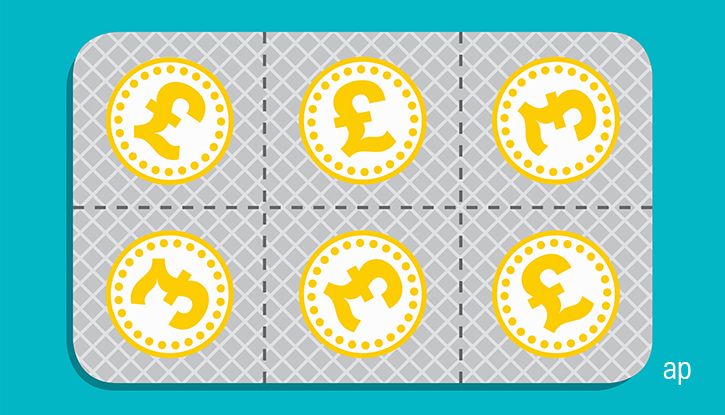
Investment trusts fared much better during the dividend drought than UK stocks and funds, according to the latest report Link Dividend Monitor. While payouts from UK companies dropped 44% in 2020 to £61.9 billion, the lowest level since 2011, investment trusts increased their dividends by 4.2% to £1.88 billion, maintaining a 10-year track record of growth. Still, there were large regional variations, with Europe-focused trusts more affected by dividend cuts than global and Asia-focused trusts. Link expects this regional disparity to continue in 2021, with global equity income funds likely to prove more resilient.
The story of 2020’s dividend crisis, which accelerated in the early part of the year but faded as economic conditions stabilised, will be painfully familiar to income investors. “Cuts this deep and this broad have never been seen before in the UK, but neither has a recession this big. Outside the UK, the picture was far better, though it was still a difficult year,” says Link. As Morningstar’s index strategist, Dan Lefkovitz explains, no one was spared the Great Dividend Disaster, although US and Canada investors fared better, especially those who avoided energy and property sectors. Link says that US banks were not subject to the same restrictions on dividends as their UK and European counterparts, and US companies in general chose to preserve cash by reducing buybacks rather than cutting dividends.
UK Trusts vs UK Stocks
Still, trusts focused on UK equities fared better than the individual stocks themselves: 75% of these held or increased their payouts in the crisis period between Q2 and Q4, and the value of the cuts was dwarfed by the size of the payouts – £19 million was cut but £525 million was paid out by these trusts. The figures look better for global equity and regional trusts, with 79% of trusts holding or increasing their dividends, but this drops to 66% for sector-specific trusts. It was not all positive, though, and there were sharp contrasts within regional trusts: three-quarters of European trusts excluding smaller companies actually cut their payouts between the start of April and the end of December.
A number of trusts highly rated by Morningstar make it in to the top 20 of payers: Silver-rated City of London investment trust (CTY) was the biggest of these with a £78.2 million payout in 2020. Manager Job Curtis has been in charge since 1991. "The combination of an exceptionally experienced and long-tenured manager, consistent process, low fees, and a focus on dividend generation makes City of London Investment Trust a compelling option for investors seeking a core UK equity income option," says Morningstar analyst Robert Starkey.
The next biggest payer last year was Murray International (MYI), which also has Morningstar Analyst Rating of Silver. Bronze-rated F&C Investment Trust (FCIT) was not too far behind with £62.8 million paid out. Country-specific trusts that made it into the top 20 payouts include Silver-rated JP Morgan Russian Securities (JRS), which paid out £15.5 million, and VinaCapital Vietnam Opportunities (VOF), which handed £30 million to shareholders.
Cash Buffers
How did investment trusts manage to fight against the tide last year? One key feature of trusts not share by open-ended funds is the “revenue reserve”, which is essentially a cash buffer of up to 15% that is designed to help them through tough times – and be built up again when conditions improve. Going into the crisis, Link estimates that UK investment trusts had revenue reserves of £2.2 billion, 20% higher than was paid out in 2019 and around 19% of what was eventually paid out in 2020. Taking into account dividends already declared, this buffer was closer to £1.6 billion.
Unsurprisingly, some 60% of trusts reported a fall in their reserves in between April to the end of December, and Link puts this as a figure of £700 million. Still, that leaves UK, global equity and regional trusts with healthy balances of over £500 million each – but sector-specific trusts have a much less to tide them over, around £50 million. Link says that fund managers have reacted to the crisis in different ways, by adjusting their portfolios to focus on higher income stocks, cutting their dividends as a last resort, or making use of the money left in the revenue reserve.
Mixed Global Picture
Looking ahead, investors still need to be selective where they put their money in a tough global environment for dividends, says Susan Ring, chief executive of Link Group UK. “Global trusts have big reserves and have seen a relatively small reduction in the dividends paid to them by the companies they hold. Continued dividend growth is likely this year from this group. Asia-Pacific and Japanese regional trusts are focused on parts of the world where the economic impact of the pandemic has been less severe so these too should hold relatively firm.”
She says that European trusts, having cut early last year, are likely to be more resilient this year, but she thinks UK-focused trusts are more vulnerable to making cuts in an uncertain environment. UK dividends are not expected to reach 2019 levels until 2025, Link forecasts. And investors should not assume they are out of the woods just yet, says Ian Sayers, chief executive of the AIC. “Investment trusts are not immune to the pandemic,” he says. “Some trusts have cut their dividends and we may yet see more follow suit. Boards will want to be sure the long-term interests of the investors are protected.”




























